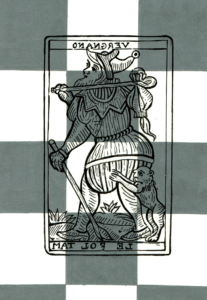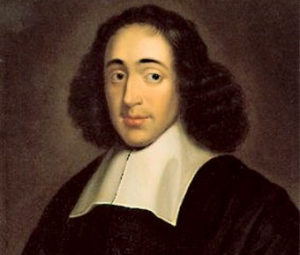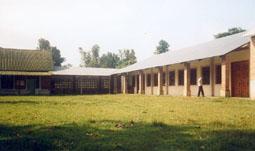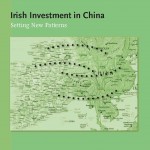Gijsbert de Reuver & Stephan Sanders (red.) ~ Gevaarlijke gekken?
Speelt de impact van een gevaarlijke gek alleen op kleine schaal of kan de gevaarlijke gek ook de samenleving en de geschiedenis veranderen? Wordt de geschiedenis gemaakt door de enkeling of is ze de uitkomst van onvermijdbare structuren en onomkeerbare processen?
Deze vragen stonden centraal bij Gijsbert de Reuver en Stephan Sanders toen ze in 2017 een reeks lezingen organiseerden voor het Instituut voor Interdisciplinaire Studies over een aantal historische en hedendaagse figuren, die nu in Gevaarlijke gekken? zijn gebundeld. De auteurs geven geen definitie van gevaarlijke gekken, maar hanteren het begrip als een ‘sensitizing concept’.
De eerste twee hoofdstukken bieden inzicht vanuit de psychologie op de vraag ‘wat is gek?’ aan de hand van het classificatiesysteem DSM-5 en met bijzondere aandacht voor de ’casus’ Trump. Zo onderzoeken Aleksander Korzec en Mecheline H.M. van der Linden of Donald Trump een narcistische persoonlijkheidsstoornis heeft. Ze constateren via de dimensionale DSM-methode dat dat inderdaad het geval is.
Paul Brill analyseert in zijn essay Trump vanuit een historische en politieke invalshoek en ziet bij Trump eveneens narcistische trekjes, maar vindt het riskant om daaruit uitspraken te doen over zijn geschiktheid als president.
De andere essays beschrijven onder meer Vladimir Poetin, Mao Zedong, Sepp Blatter, Ulrike Meinhof en Slobodan Milosevic. Wat zijn hun persoonlijke, politicologische en historische achtergronden en wie inspireerden hen? Hoe voeren zij hun macht uit? Kunnen ze worden gedefinieerd als ‘gevaarlijke gekken?’
Read more
Noam Chomsky: Moral Depravity Defines US Politics
 The US midterm elections of November 6, 2018, produced a divided Congress and essentially reaffirmed the existence of two nations in one country. But they also revealed, once again, the deep state of moral and political depravity that prevails in the country’s political culture — at least insofar as political campaigns go. In the exclusive interview below, world-renowned scholar and public intellectual Noam Chomsky discusses how the major issues confronting the United States and the world at large were barely addressed by the majority of candidates of both parties.
The US midterm elections of November 6, 2018, produced a divided Congress and essentially reaffirmed the existence of two nations in one country. But they also revealed, once again, the deep state of moral and political depravity that prevails in the country’s political culture — at least insofar as political campaigns go. In the exclusive interview below, world-renowned scholar and public intellectual Noam Chomsky discusses how the major issues confronting the United States and the world at large were barely addressed by the majority of candidates of both parties.
C.J. Polychroniou: Noam, with people still arguing about winners and losers from the 2018 midterm elections (and there is clearly a lot to say about what those elections mean), what do you consider to be the most striking features of the latest manifestation of American democracy in action?
Noam Chomsky: The most striking features are brutally clear.
Humanity faces two imminent existential threats: environmental catastrophe and nuclear war. These were virtually ignored in the campaign rhetoric and general coverage. There was plenty of criticism of the Trump administration, but scarcely a word about by far the most ominous positions the administration has taken: increasing the already dire threat of nuclear war, and racing to destroy the physical environment that organized human society needs in order to survive.
These are the most critical and urgent questions that have arisen in all of human history. The fact that they scarcely arose in the campaign is truly stunning — and carries some important, if unpleasant, lessons about our moral and intellectual culture.
To be sure, not everyone was ignoring these matters. They were front and center for those who are constantly vigilant in their bitter class war to preserve their immense power and privilege. Several states had important ballot initiatives addressing the impending environmental catastrophe. The fossil fuel industry spent huge, sometimes record-breaking, sums to defeat the initiatives — including a carbon tax in the mostly Democratic state of Washington — and mostly succeeded.
We should recognize that these are extraordinary crimes against humanity. They proceed with little notice. Read more
Spinoza ~ Ethica, work without obstacle
Ethica, work without obstacle, is funded by Conseil régional des Hauts de France, and FEDER, a thematic and structuring project 2015-2018 of the University of Picardy Jules Verne.
Go to: http://app.ethica-spinoza.net/fr/connections
Patrick Fontana received in 2013, the grant Brouillon d’un Rêve Pierre Schaeffer from Société Civile des Auteurs Multimédia (French multimedia publishing rights society) (SCAM), and the grant aide à l’écriture et au développement aux nouveaux médias from Centre National du Cinéma et de l’image animée, France, (CNC), with the unanimous decision of the jury.
Patrick Fontana and TYGRYZ Compagny, received in 2016, the grant aide à la production DICREAM from Centre National du Cinéma et de l’image animée, France, (CNC).
Ethica has been hosted and supported (2015-2016) by the Fondation Maison des Sciences de l’homme, Paris, scientific director, Jean-Pierre Dozon.
The Social and Political Thought Research Group, Brunel University of London participated in the financing of Ethica’s teaser in 2015.
Production : Emmanuel Ryz, Patrick Fontana
Designers : Bachir Soussi Chiadmi, Kevin Tessier
Library Of Congress ~ The National Screening Room
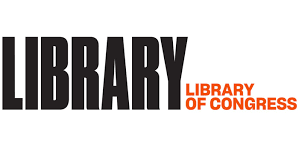 The National Screening Room showcases the riches of the Library’s vast moving image collection, designed to make otherwise unavailable movies, both copyrighted and in the public domain, freely accessible to the viewers worldwide.
The National Screening Room showcases the riches of the Library’s vast moving image collection, designed to make otherwise unavailable movies, both copyrighted and in the public domain, freely accessible to the viewers worldwide.
The majority of movies in the National Screening Room are freely available as both 5 mb MP4 and ProRes 422 MOV downloads.
The National Screening Room is a project of the Library of Congress National Audio-Visual Conservation Center. The goal of this digital collection is to present to the widest audience possible movies from the Library’s extensive holdings, offering a broad range of historical and cultural documents as a contribution to education and lifelong learning.
These selections are presented as part of the record of the past. They are historical documents which reflect the attitudes, perspectives, and beliefs of different times. The Library of Congress does not endorse the views expressed in these movies, which may contain content offensive to users.
Go to: https://www.loc.gov/national-screening-room/
Bamanya: Books in the Jungle
Mbandaka is the centre of the world, if you stand in front of a world map and draw a diagonal cross. It is where Henry Morton Stanley founded an ‘outpost of progress’: Equator Station, the beginning of the history of this small town on the equator. Nowadays Mbandaka is one of the biggest towns in Congo, with an estimated population of 100.000-150.000 inhabitants. Located on the river Congo, it is a poor town, with little or no industry.
Traces of ‘l’époque coloniale’ can be found in the town centre. Along wide streets stand beautiful houses, or their remains, where the colonials once lived. Thirty years of decay have not left much intact. Mbandaka is the capital of the province of Equateur. The region is looked upon with some condescendence by the rest of Congo: it is the land of hunters and fishermen.
The mission village Bamanya is located ten kilometres outside of Mbandaka. The sandy road that leads there is paved with gaps and holes, many of them filled with yellowish water.
On the first morning of my stay there, the sound of jubilation wakes me up. Some two hundred children’s voices singing make the best alarm ever. Once a week the children of the mission school walk to a village nearby, singing the whole journey.
It is six thirty. I take a cold shower and when I get dressed, sweat is running down my face.
Annales Aequatoria
The one hundred and fifty subscribers of Annales Aequatoria must be patient a little longer. The aluminum plates for the printers in Kinshasa have been waiting for clearance in the port of Matadi (Congo’s main port) for months. It is just one of the many problems you encounter when trying to undertake anything in this country. Setbacks are met with a ‘C’est L’Afrique’ and, well yes, it is.
Centre Aequatoria, Centre de Recherches Culturelles Africanistes, publishes the yearbook Annales Aequatoria. The Centre Aequatoria is part of the mission post and has a library of over 10.000 books and extensive archives. The books mainly focus on the history of Congo, with an emphasis on local history, and on African languages. The language of the region, Lomongo, occupies a special place. The archives consist in unique materials on the history of the region and the mission post.
The climate has surprisingly slight effect on the condition of the books. The most dangerous enemies come crawling from outside: termites.
The collection of the Centre Aequatoria library is incomplete. It is no miracle that important books are missing, considering the annual budget for books and magazines is around 1000 euros. Furthermore considering other obstacles – no mailmen in Congo, only 3 hours of electricity a day at the mission, and no modern means of communication – it is a miracle that the library still exists and is maintained.
A library is an oasis of calm and culture. If you sit reading surrounded by thousands of books, it does not matter where in the world you are. You are always at home.
Aequatoria is an oasis to Prof. dr. Motingea Mangulu. He has his own room in the guesthouse, with his books and a computer. Prof Mangulu received his title with a study on Ngiri-languages in Leiden, 1996. He lived there for a year and a half. ‘Aequatoria is the only place where I can work. Not only because of the library, but because of the peace and quiet.’ My question whether it is hard to work here, after spending nearly two years in an academic environment of endless possibilities, is met with a melancholic smile. ‘That is difficult. It is different here. Here you have to survive.’ I don’t ask, but know that the average income of a professor in Congo is little under the price of a crate of beer. ‘You don’t compare’, says Professor Mangulu. ‘I have to work here now with these possibilities. And I am glad to have this place. I can work here. I can have discussions with Father Vinck. And I get intellectual stimulation.’
Father Honoré Vinck (1941), member of the Congregation of Missionaries of the Sacred Heart, is the director of the Centre Aequatoria. Dreamer and activist, Flemish nationalist and citizen of the world, modest and dominant, solitary and a people’s person, eloquent and silent, an ascetic with a glass of beer in his hand.
One morning while musing over the small graveyard, I hear behind me: ‘I love to dream. A person has to dream. Otherwise you don’t make plans. And you have to make plans before being able to accomplish them. When I start doing that, nobody and nothing is going to stop me. That is my nature.’
After finishing secondary education Honoré Vinck studied theology and philosophy. At the end of the nineteen fifties the church was still traditional and devout. He still holds his classical education in great esteem. In the first two years he was introduced to Aristotelian philosophy, which provided him with the tools to think for himself, and create his own worldview. Above all, his study time in Belgium brought many pleasures. Whether it was science or literature, Vinck devoured everything. He specialized in church history, and especially liturgy. Meanwhile the church started changing in the sixties, and after his studies Vinck moved to Paris for a degree in theology.
May 68
One morning Vinck rides the subway to read mass to the sisters near the Unesco-building. ‘Révolution’ is written on a wall in thick letters. It is May ’68.
‘That has been a crucial experience in my life. My political thinking has been shaped by it, in many ways. How does power relate to the people, to society? How do ideologies relate to society? It is no small thing. There you saw the enormous power of thought, of thinking. The power of pressure groups. The miracle of idealism.’ Read more
Climate Change Is The Product Of How Capitalism “Values” Nature
Climate change is the greatest existential crisis facing humanity today. Capitalist industrialization has led us to the edge of the precipice, and avoiding the end of civilization as we know it may require the development of a view in direct opposition to the way in which capitalism “values” nature, according to John Bellamy Foster, professor of sociology at the University of Oregon and editor of the socialist magazine Monthly Review.
C. J. Polychroniou: We live in a period of massive environmental disturbance, such that it has led to the claim that we are no longer in the Holocene epoch but instead in the midst of the Anthropocene era. Assuming that this claim, popularized in the West by the atmospheric chemist and Nobel laureate Paul Crutzen, is scientifically correct, to what extent can economic growth itself be blamed for the catastrophic effects of human activities on the environment, including influencing the climate by burning fossil fuels, cutting down rainforests and farming livestock?
John Bellamy Foster: It is worth noting that the Anthropocene concept originated in the early USSR. It first appeared in the English language in the translation of The Great Soviet Encyclopedia in the 1970s. This arose out of discussions of anthropogenic change and the biosphere pioneered in Soviet science, pointing to today’s Earth System perspective and to our current, more developed notion of the Anthropocene.
It now appears to be the consensus in natural science that the Anthropocene epoch in geological history commenced in the early 1950s, marked by a Great Acceleration of anthropogenic impacts on the Earth System. The 2018 special report of the IPCC released last month emphasizes the shift from the Holocene to the Anthropocene as signifying that anthropogenic factors are now the leading sources of change in the Earth System, most notably in the form of climate change. Economic activity at present, as you note, relies heavily on burning fossil fuels, cutting down rainforests, and livestock farming, all of which lead to the emission of greenhouse gases that are accelerating climate change.
Today’s planetary ecological crisis is due first and foremost to the increasing scale of the capitalist world economy. The greater the scale of the economy the more it rivals the fundamental biogeochemical cycles of the planet. All of this is connected to the nature and logic of capitalism, understood as a system directed at the accumulation of capital. Capitalism is a grow-or-die system. If accumulation declines, the result is economic crisis. The answer of the system is to boost accumulation. This, however, intensifies global environmental crises as the already visible impact of the economy on the Earth System increases.
To speak of economic growth as a principal problem, and of the need for a steady-state economy as a solution, immediately raises the specter in people’s minds of the end of human progress. However, we should be careful not to identify economic growth, as that term is used today, with human advancement as a whole. Economic growth was deified in the 1950s, following the introduction of national income accounting during the Second World War. The system of national or Gross Domestic Product (GDP) accounting is rooted in capitalist notions of value added, profit and accumulation. It accurately reflects the logic of capital accumulation but it is far removed from growth in the wider sense in which people usually think of it. Read more
